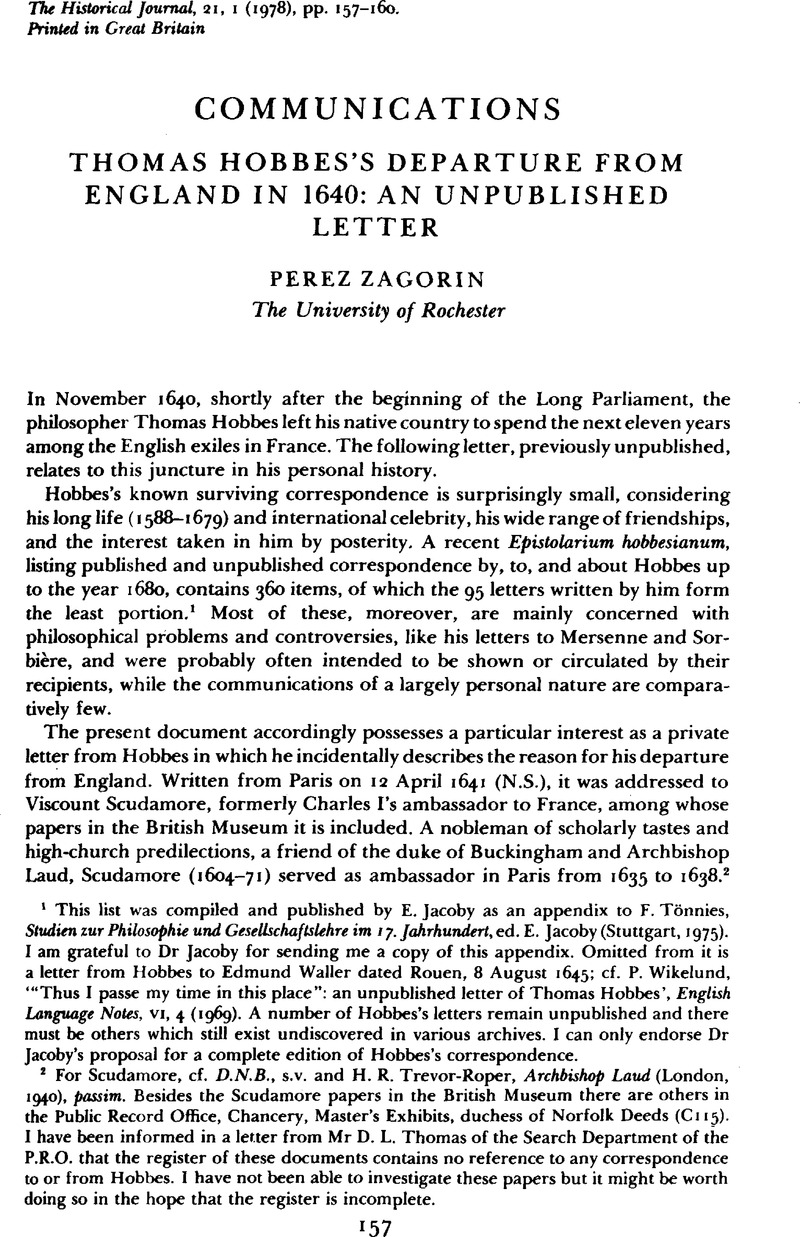Article contents
Thomas Hobbes's Departure from England in 1640: an Unpublished Letter
Published online by Cambridge University Press: 11 February 2009
Abstract

- Type
- Communications
- Information
- Copyright
- Copyright © Cambridge University Press 1978
References
1 This list was compiled and published by E. Jacoby as an appendix to Tönnies, F., Studien zur Philosophie und Gesellschaftslehre im 17. Jahrhundert, ed. Jacoby, E. (Stuttgart, 1975).Google Scholar I am grateful to Dr Jacoby for sending me a copy of this appendix. Omitted from it is a letter from Hobbes to Edmund Waller dated Rouen, 8 August 1645; cf. Wikelund, P., ‘“Thus I passe my time in this place”: an unpublished letter of Thomas Hobbes’, English Language Notes, vi, 4 (1969).Google Scholar A number of Hobbes's letters remain unpublished and there must be others which still exist undiscovered in various archives. I can only endorse Dr Jacoby's proposal for a complete edition of Hobbes's correspondence.
2 For Scudamore, cf. D.N.B., s.v. and Trevor-Roper, H. R., Archbishop Laud (London, 1940)Google Scholar, passim. Besides the Scudamore papers in the British Museum there are others in the Public Record Office, Chancery, Master's Exhibits, duchess of Norfolk Deeds (C115). I have been informed in a letter from Mr D. L. Thomas of the Search Department of the P.R.O. that the register of these documents contains no reference to any correspondence to or from Hobbes. I have not been able to investigate these papers but it might be worth doing so in the hope that the register is incomplete.
3 Cf. D.N.B., s.v., ‘William Cavendish, third earl of Devonshire.’
4 Hobbes, T., English works, ed. Molesworth, W. (11 vols., London, 1839–1845), iv.Google Scholar This was first printed with a slightly different title in 1662; cf. Macdonald, H. and Hargreaves, M., Thomas Hobbes: a bibliography (London, 1952, pp. 49–50).Google Scholar Molesworth reprints the 1680 edition.
5 Ibid. iv, 414.
6 Thomas Hobbes…Vita carmine expressa, 1681, in Latin works, ed. Molesworth, W. (5 vols., London, 1839–1845), i, xcGoogle Scholar; cf. also his prose Vita, 1681, ibid. i, v.
7 Mersenne, Marin, Correspondance, ed. de Waard, C. (12 vols., Paris, 1932–1972), x, 210.Google Scholar
8 Cf. Zagorin, P., The court and the country (N.Y., 1970), pp. 207, 209.Google Scholar
9 Cf. Skinner, Quentin, ‘Thomas Hobbes and his disciples in France and England’, Comparative Studies in Society and History, viii (1965–1966).Google Scholar
10 Mersenne, M., op. cit. viii, 359 n.Google Scholar, contains some details on du Bosc, who ‘assura souvent les communications entre Français et Anglais…’; de Sorbière, S., Lettres et discours…sur diverses matières curieuses (Paris, 1660), letters 29–30.Google Scholar
11 Quentin Skinner, “Thomas Hobbes and his disciples”.
12 I have extended the contractions in the text but otherwise made no alterations.
13 Hobbes's ‘my Lord’ is William Cavendish, third earl of Devonshire. He must have arrived in London after attending the Council of Peers called by Charles I at York between 24 September and 28 October 1640 to deal with the emergency created by the Scottish Covenanters' invasion of England.
14 Obviously Hobbes kept clear of Scudamore for a time to make sure that he had not caught the plague.
- 7
- Cited by


